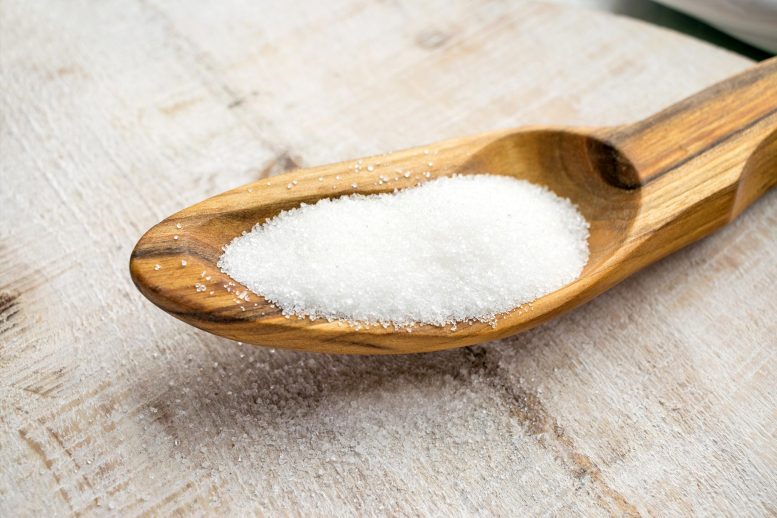
Scientists at the Francis Crick Institute discovered that high consumption of sucralose, a common artificial sweetener, lowers T-cell activation in mice, a crucial component of the immune system. While normal dietary consumption of sucralose is not harmful, these findings could potentially lead to therapeutic uses for patients with autoimmune diseases, where high doses of sucralose could help mitigate harmful effects of overactive T-cells.
Researchers at the Francis Crick Institute have discovered that consuming large amounts of the commonly used artificial sweetener, sucralose, decreases the activation of T-cells, a crucial aspect of the immune system, in mice.
If similar effects are observed in humans, sucralose could potentially be utilized as a therapeutic agent to suppress T-cell responses. This could be beneficial for individuals with autoimmune diseases who suffer from uncontrolled T-cell activation.
Sucralose is an artificial sweetener, about 600 times sweeter than sugar, that is commonly used in drinks and food. Like many other artificial sweeteners, the effects of sucralose on the body are not yet fully understood, although recent studies have shown that sucralose can impact human health by affecting the microbiome.
In their study, funded by Cancer Research UK and recently published in the journal Nature, the researchers tested the impact of sucralose on the immune system in mice.
Mice were fed sucralose at levels equivalent to the acceptable daily intake recommended by the European and American food safety authorities. Importantly, while these doses are achievable, they would not normally be reached by people simply consuming food or drinks containing sweeteners as part of a normal diet.
The mice fed diets containing high doses of sucralose were less able to activate T cells in response to cancer or infection. No effect was seen on other types of immune cells.
By studying T cells in more detail, the researchers found that a high dose of sucralose impacted intracellular calcium release in response to stimulation, and therefore dampened T -cell function.
This research should not sound alarm bells for those wanting to ensure they have a healthy immune system or recover from disease, as humans consuming normal or even moderately elevated levels of sucralose would not be exposed to the levels achieved in this study.
Instead, the researchers hope the findings could lead to a new way of using much higher therapeutic doses of sucralose in patients, building on the observation that when mice with T cell-mediated autoimmune disease were given a high-dose sucralose diet, this helped to mitigate the harmful effects of their overactive T cells.
Karen Vousden, senior author and principal group leader at the Crick, says: “We’re hoping to piece together a bigger picture of the effects of diet on health and disease, so that one day we can advise on diets that are best suited to individual patients, or find elements of our diet that doctors can exploit for treatment.
“More research and studies are needed to see whether these effects of sucralose in mice can be reproduced in humans. If these initial findings hold up in people, they could one day offer a way to limit some of the harmful effects of autoimmune conditions.”
Fabio Zani, co-first author and postdoctoral training fellow at the Crick, adds: “We do not want people to take away the message that sucralose is harmful if consumed in the course of a normal balanced diet, as the doses we used in mice would be very hard to achieve without medical intervention.
“The impact on the immune system we observed seems reversible and we believe it may be worth studying if sucralose could be used to ameliorate conditions such as autoimmunity, especially in combinational therapies.”
Julianna Blagih, co-first author and former postdoctoral training fellow at the Crick (now Assistant Professor at the Maisonneuve-Rosemont Hospital Research Centre, University of Montreal), explains: “We’ve shown that a commonly used sweetener, sucralose, is not a completely inert molecule and we have uncovered an unexpected effect on the immune system. We are keen to explore whether there are other cell types or processes that are similarly affected by this sweetener.”
Karis Betts, senior health information manager at Cancer Research UK, said: “This study begins to explore how high doses of sucralose could potentially be used in new treatment options for patients, but it’s still early days.
“The results of this study don’t show harmful effects of sucralose for humans so you don’t need to think about changing your diet to avoid it.”
The researchers are continuing this work and are hoping to run trials to test if sucralose has a similar effect in humans.
Reference: “The dietary sweetener sucralose is a negative modulator of T cell-mediated responses” by Fabio Zani, Julianna Blagih, Tim Gruber, Michael D. Buck, Nicholas Jones, Marc Hennequart, Clare L. Newell, Steven E. Pilley, Pablo Soro-Barrio, Gavin Kelly, Nathalie M. Legrave, Eric C. Cheung, Ian S. Gilmore, Alex P. Gould, Cristina Garcia-Caceres and Karen H. Vousden, 15 March 2023, Nature.
DOI: 10.1038/s41586-023-05801-6









It would be nice to know what the name of the sweetener is as the consumer knows it.
Splenda
“This research should not sound alarm bells for those wanting to ensure they have a healthy immune system or recover from disease”
OH YES IT SHOULD, the article states that it suppresses T-cell response to cancer cells, code for, could I crease the risk of it spreading.
With the exponential increase in use of these ghastly “sweeteners” in virtually everything, plus the huge increase in various cancers, when is a “team of scientists” going to tell us the truth, rather than keeping schtum while whoring for funding for the latest food fad.
Also with the imposition of sugar taxes our choice not to be poisoned is reducing daily. IL take my chances with tried and tested sugar or xylitol, but scandalously our choices are diminishing daily. In the UK, Jamie bloody Oliver needs flaying alive for his campaign for a sugar tax that is resulting in the nation being poisoned by addictive sweeteners.